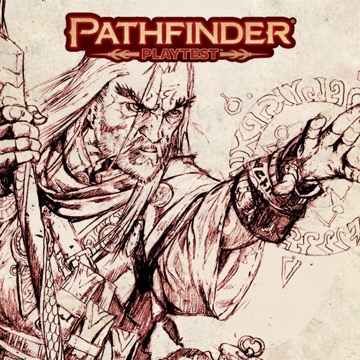With Paizocon getting underway in just a few days, we wanted to round out our previews by looking at the final class that you will be able to play at the show. So, without further delay, it's time to look at the wizard!
Wizard Features
If you are building a wizard, everything starts with your key ability, Intelligence. Having a high Intelligence gives you a boost to the DCs of your spells, and it gives you more skill choices at 1st level.
At 1st level, you begin play with a spellbook containing 10 cantrips and eight 1st-level spells, giving you a wide variety of spells to draw upon when you prepare your magic each morning. Starting out, you can prepare four cantrips and two 1st-level spells each day. In addition, you also select your arcane school at 1st level, which grants you one extra spell slot of each level that you can use only to prepare a spell from your chosen school. You can compare this to the cleric, who doesn't get extra spell slots, but instead gets a narrow ability to cast extra heal or harm spells. Your school also grants you a school power that you can cast using a pool of Spell Points. Take a look at the nifty power you can pick up from choosing divination as your school. (Remember, that [[A]] code you see indicates that this is an action, and it will be a snazzy icon in the final rulebook!)
DIVINER'S SIGHT
Concentrate, Divination, Fortune
Casting [[A]] Verbal Casting
Range 30 feet; Targets one willing living creature
Duration end of your next turn or until dismissed
You glimpse into the target's future. Roll a d20. When the target attempts a Perception check, saving throw, or skill check, it can use the number you rolled instead of rolling, and the spell is dismissed. Casting it again dismisses any active diviner's sight.
Even if you don't roll so great, it might still help avoid a critical failure on a vital saving throw.
You can forgo selecting an arcane school, instead choosing to be a universalist. This grants you a bonus wizard feat and extra uses of your arcane focus.
Speaking of which, all wizards gain the ability to place some of their power into a designated item called an arcane focus. You can drain the power from that focus once per day to cast any one spell that you have already cast without spending another spell slot. Universalists get to use this ability once for each level of spell that they can cast!
As a wizard goes up in level, they gain more spells that they can cast (either one extra spell of their highest level, or two of a new level) and their proficiency at spellcasting also increases. They start as trained, but rise to the rank of legendary at 19th level.
Wizard Feats
Wizards have never had too many class features to choose from to help distinguish them from one another, so when it came time to design feats for the wizard, it was a clear opportunity to add some variety to the class.
Lets start out with a few classic concepts. At 1st level, you can pick up a feat that allows you to spend your reaction to counterspell any spell someone else casts as long as you currently have that spell prepared. If that isn't to your taste, you can take a wizard feat to recruit a familiar instead. Every day, you can select a pair of abilities to give this loyal companion, some of which grant you boons as well. At high levels, your familiar can even grant you an additional spell slot, as long as it is 3 levels lower than the highest-level spell you can cast. At 8th level you can select from a series of feats that enhance the power of your arcane school, increasing your pool of Spell Points and granting you an extra spell you can cast using that pool. One of my favorites is the necromantic power called life siphon, which lets you draw some of the magic from a non-cantrip necromancy spell you cast to regain 1d8 Hit Points per level of the spell.
Not surprisingly, the wizard also has a lot of feats to choose from that modify the spells that you cast. While many of these metamagic feats will be familiar to veterans of the game, allowing you to extend the reach or widen the area of a spell, for example, others are new. Conceal Spell lets you add an action to a spell as you cast it to hide the fact that you are casting. Focus Conservation is an action you can add to any spell that you cast by draining your arcane focus, and it lets you drain your arcane focus again the next round, casting another spell as long as it is 2 levels lower than the spell you just cast. Better still, you can keep using this feat as long as you have lower-level spells to cast. For example, if you start out draining your focus to cast cone of cold (a 5th-level spell dealing a wicked 11d6 cold damage to all your enemies), you could follow it up next round with a fireball. If you use the feat again, you could drain focus again on the following round, casting any 1st-level spell you had already cast.
As a wizard rises to the highest levels of power, their feats grant them more and more options when determining how to best utilize their spells. Effortless Concentration gives you a free action at the start of each round to concentrate on a spell you have cast, freeing you up to use all 3 actions normally. Superior Focus gives you another use of your arcane focus. Quick Preparation lets you swap out spells you have already prepared in just 10 minutes. At 20th level, you can pick Spell Combination, which lets you combine two spells into one terrifying attack that you can unleash on one unfortunate foe.
Spells
One of the biggest ways you can customize your wizard is in your spell selection, so it's probably worth looking at a few signature wizard spells to see how they work. Let's start with one of the most iconic spells of them all.
MAGIC MISSILE SPELL 1
Evocation, Force
Casting [[A]] Verbal Casting or more
Range 120 feet; Targets one creature
You send a dart of force streaking toward a creature that you can see. It automatically hits and deals 1d4+1 force damage. When Casting this Spell, you can increase the casting by a Material Casting action, a Somatic Casting action, or both. For each component you add, increase the number of missiles you shoot by one. You choose the target for each missile individually.
Heightened (+2) You shoot one additional missile with each action you spend.
Magic missile shows off a couple of interesting options in the wizard's arsenal. Casting a spell can be done in a number of ways using a variable number of actions. While most of the time this is through metamagic feats, it can also come from the spell itself. Adding casting actions to magic missile gives you more missiles to throw. In addition, a wide variety of spells can be prepared using a higher-level spell slot, giving you a better effect without having to refer to an entirely different spell. (You can find out more about that in the All About Spells blog.) That means you can prepare magic missile as a 9th-level spell and spend three actions casting it for 15 missiles!
Another important aspect of picking spells for your wizard is to balance what saving throws they allow and what effects you can get depending on the results of the save. For that, let's take a look at a spell that might instantly kill a foe.
PHANTASMAL KILLER SPELL 4
Death, Emotion, Fear, Illusion, Mental
Casting [[A]] Somatic Casting, [[A]] Verbal Casting
Range 120 feet; Targets one living creature
You create a phantasmal image of the most fearsome creature imaginable to the target. Only the spell's target can see the killer, though you can see the vague shape of the illusion as it races forth to attack. The effect of the killer is based on the outcome of the target's Will saving throw.
Success The target is frightened 1.
Critical Success The target is unaffected.
Failure The target takes 8d6 mental damage and is frightened 2.
Critical Failure The target is so afraid it might instantly die. It must attempt a Fortitude saving throw; if the target fails, it is reduced to 0 Hit Points and dies. On a successful Fortitude save, the target still takes 12d6 mental damage, is fleeing until the end of its next turn, and is frightened 4.
Heightened (+1) The damage on a failure increases by 2d6 and on a critical failure by 3d6.
This spell is perfect for removing a lower-level foe from a fight, but it has the chance of greatly hampering a higher-level foe as well. The frightened condition reduces by 1 each turn, but it applies a penalty to almost all of your checks and rolls until it does. You will find interesting choices like these throughout the arcane spell list. While most will be familiar to a Pathfinder veteran, there are a lot of new spells to explore as well, from grim tendril to chromatic wall, so your wizard will be ready for anything.
Well, that wraps up our look at the wizard. If you want to give this class (or the alchemist, cleric, fighter, paladin, or rogue) a try, make sure to stop by PaizoCon (this weekend), the UK Games Expo (early June), or Origins (mid-June), as we'll be running demos during all three conventions!
Jason Bulmahn
Director of Game Design










